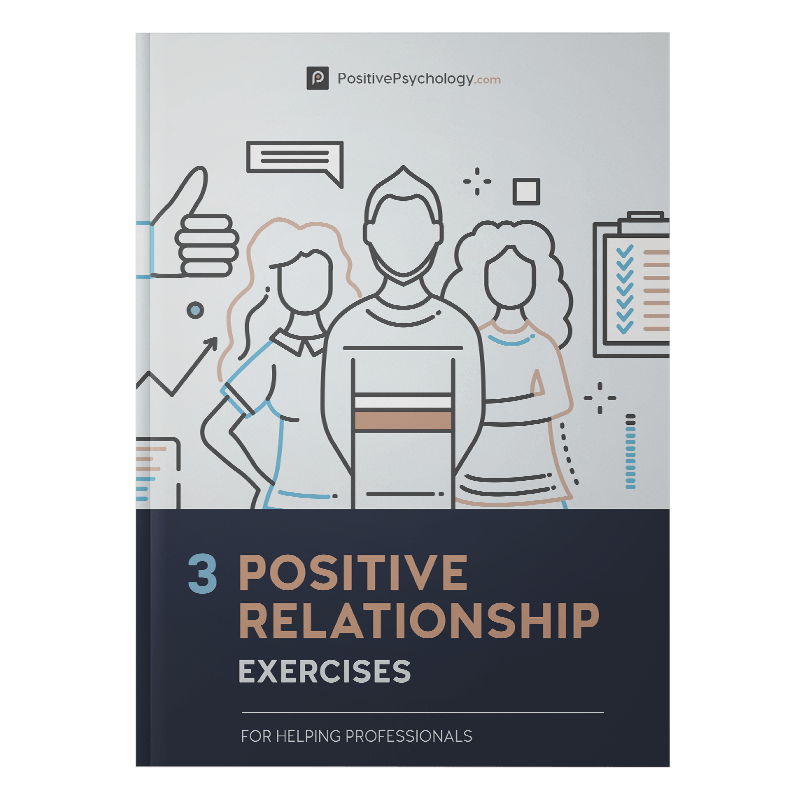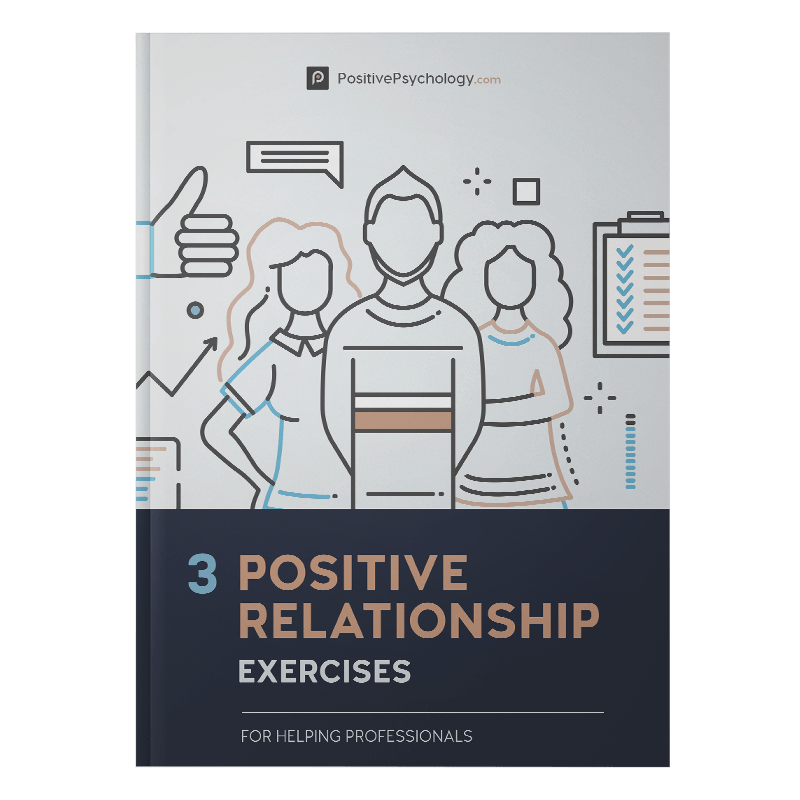Pets & Wellbeing: 15 Benefits of Emotional Support Animals
 As I write, my dog lies beside me, snoring.
As I write, my dog lies beside me, snoring.
He’s our companion, colleague, friend, and family member.
Despite ignoring most commands and eating what he shouldn’t, he is deeply loved and the ideal listener.
While often boisterous, when approached by a child or someone elderly or less able, he yields and becomes passive. They give him a rub or a hug, and he gives them acceptance and love without judgment.
And it’s no surprise. The emotional bond between a pet and a human can be as intense as with another person and brings similar psychological benefits (McNicholas et al., 2005).
This article discusses how pets benefit our mental health and the emotional support they bring.
Before you continue, we thought you might like to download our three Positive Relationships Exercises for free. These detailed, science-based exercises will help you or your clients build healthy, life-enriching relationships.
This Article Contains:
15 Benefits of Pets for Mental Health
Many research studies have confirmed the positive effects of keeping pets. Indeed, health professionals increasingly recognize their value in treating mental and physical conditions (McNicholas et al., 2005).
Pets offer companionship and so much more.
Many people experiencing mental health problems report that the combination of caring for animals and the unconditional love they receive back is life changing, improving their mental wellbeing and their quality of life (Robinson, 2020).
When we think of our ancestors’ behavior, such connections are to be expected.
Humans have been keeping pets and building working relationships with animals for well over 10,000 years (Barras, 2018; Page, 2020). It is no surprise then that many pets – dogs in particular – can understand words we use and recognize our tone of voice, gestures, and body language.
Having someone (nonhuman) that needs us and can gauge how we feel without expectation or judgment is hugely valuable.
Mental health charities have recognized the importance of pets and often promote pet ownership for its psychological and physical health benefits (Mental Health Foundation, 2018; Lundgren, Robinson, & Segal, 2020):
Owners of pets:
- Are less likely to suffer depression
- Have lower blood pressure during stressful situations
- Display reduced levels of triglyceride and cholesterol (high levels can be indicators of heart disease)
- Survive longer after having a heart attack
- Make 30% fewer visits to the doctor after the age of 65
- Live longer
More generally:
- Playing with pets increases levels of serotonin and dopamine, promoting calm and relaxation.
- Pets provide companionship and fulfill the basic human need for touch. Contact is particularly important for people who are lonely or who have not previously experienced mutual affection.
- Prisoners have exhibited long-term behavioral changes after interacting with pets.
- Pets improve the quantity and quality of socialization, providing conversation points when meeting people out walking.
- Pets require regular feeding, exercise, and attention and can bring structure to the day.
- Hugging and stroking an animal provides almost immediate relief from stress and anxiety.
- Dogs in particular encourage healthy outdoor exercise that improves physical and mental wellbeing.
- Older adults (including those with Alzheimer’s disease or dementia) can find more meaning and joy in life, stay more connected, and boost their vitality through pet ownership.
- Children learn more compassion, empathy, and responsibility, strengthening their emotional intelligence, through having pets. Such interaction can be beneficial for children with attention deficit-hyperactivity disorder and autism.
While we associate many of the benefits with dogs and cats, other animals have also been shown to improve their owners’ wellbeing, including fish, rabbits, birds, snakes, and lizards.
Whether the direct effect is psychological or physiological, indirectly, it all contributes to mental wellbeing.
The Psychology Behind Emotional Support Animals

Campaigners argue for such animals to be considered as service animals rather than pets and viewed as assistive aids in the same way as wheelchairs (Von Bergen, 2015).
The importance of animals to people’s lives embraces a “broader definition of health that encompasses the dimensions of wellbeing (physical and mental) and a sense of social integration” (McNicholas et al., 2005).
There are at least three different ways of looking at the association between pet ownership and its apparent health benefits (McNicholas et al., 2005):
- There is no direct association. Other factors that impact the decision to own a pet confer health benefits to the owner.
- Pets improve social interaction with other humans, reducing loneliness and social isolation and indirectly improving wellbeing.
- The pet–human relationship provides emotional support that directly benefits human health and wellbeing.
The value behind pet ownership is most likely a combination of the above. Besides, we should remember that good health is far more than the absence of illness and involves satisfaction of basic psychological needs and quality of life (Ryan & Deci, 2018).
Furthermore, we do not need to own animals to receive the associated mental health benefits.
Indeed, emotional support animals are increasingly used in mental health settings to provide individuals with the following (Jau, 2014):
- Company and comfort
- Social interaction
- Social skills and belonging
- Structure and life balance
- Life skills
- Passionate caring
- Sense of achievement
- Fun and enjoyment
Caring for animals encourages social interaction and the development of social skills, and interacting with them offers comfort and company. All of which improve mental health and wellbeing (Jau, 2014).
Jasmin Jau (2014) carried out a series of interviews with patients who have had prolonged mental health issues to understand how animal-assisted interventions had helped.
Results of her research confirmed the value of animals in improving patients’ lives.
Underlying each of the above benefits was the promotion of one or more of the following psychological factors (Jau, 2014):
- Social support hypothesis
Animals provide nonjudgmental social support through their perceived unconditional love. - Social connection
Belonging and connectedness are an integral part of mental health and wellbeing (Shochet, Dadds, Ham, & Montague, 2006). “Animal interaction can act as the vehicle through which social connection may be enhanced or increased” (Jau, 2014). - Provision of structure
Caring for animals requires structure and routine. Such a balanced approach to life can facilitate recovery from mental health disorders (Martell, Dimidjian, & Herman-Dunn, 2010). - Altruistic behavior
Helping others, including nonhumans, leads to feelings of being useful. Altruistic behaviors have been shown to benefit social relationships and self-acceptance, and promote a sense of purpose in life (Wink & Dillon, 2007). - Learning and development
An essential part of interacting with animals includes learning and developing new skills. Improving problem solving and critical thinking in one area can be transferred to other areas of life (Jau, 2014). - Activity and interest
Mental illness, such as depression, is often characterized by a lack of interest and inactivity. Individuals caring for animals report an increased sense of engagement (Jau, 2014).
Working with and caring for animals not only promotes stress reduction and improved quality of life, but also encourages social and community interaction. This combination offers a complete, multidimensional approach to promoting mental wellbeing (Brooks et al., 2018).
Why Are Animals Good for Our Wellbeing? 5 Research Findings

In a detailed review of the existing literature, Brooks et al. (2018) set out to understand:
- The impact of pets on our mental health
- What mechanism underlie these effects
Based on the findings from 17 studies that investigate pet ownership, the benefits can be grouped into the following themes (Brooks et al., 2018):
Easing worry, providing comfort, reducing sense of isolation and loneliness
Pets “provide unique emotional support because of their ability to respond to their owners intuitively, especially in times of crisis” and when they were feeling most isolated and alone (Brooks et al., 2018).
Indeed, research showed that people often confided in their pets when unable to do so with other people. They felt safe to open up without being judged.
Physical activity and symptom distraction
Dog ownership in particular was associated with physical activity. Pets also appeared to help in a very practical sense, distracting and disrupting owners’ focus on unwanted symptoms or upsetting experiences (including panic attacks, hearing voices, and suicidal thoughts).
The presence of the pet was often associated with lessening symptoms by:
- Introducing humor into the situation
- Grounding the situation
- Providing the owner with the opportunity to engage in caring activities: brushing, stroking, feeding, etc.
Individuals reported requiring less medication while feeling more positive and an increased sense of self-efficacy.
Conduits to social interaction and emotional nourishment
The presence of animals can lead to an increase in the quality and quantity of social interactions.
Several studies reported pets increased interactions with family, friends, and the local community. They cited several reasons including increased confidence in engaging with others (including in more difficult conversations) while the pet was present and the motivation to venture outside.
Sense of self-worth, identity, and existential meaning
Two of the studies in the review suggested that having pets led to an increased sense of meaning in tasks and participants feeling better about themselves as individuals.
Participants reported that they felt a heightened sense of identity and self from having to care for and protect their pet.
Disadvantages
The review, however, added a note of caution. There can be downsides to pet ownership and the management of mental health disorders (Brooks et al., 2018). Challenges for pet owners include:
- Financial burden
- The inevitable death of the pet
- Potential housing issues
- Implications of unruly pet behavior
Brooks et al. (2018) uphold the view that having pets, including dedicated companion animals for the general population, can positively affect people’s mental wellbeing, particularly those diagnosed with mental health disorders.
They summarize by saying that pets benefit people with mental health conditions “through the intensity of connectivity with their owners and the contribution they make to emotional support in times of crises together with their ability to help manage symptoms when they arise” (Brooks et al., 2018).
A Look at 10 Animal Therapy Modalities

- As part of psychotherapy
- During counseling sessions
- In psychiatric treatment
- Treating at-risk children and youths
- In classrooms with general and specialist needs, including autism spectrum disorders
- In family settings
- With older age groups, including in care settings
- With palliative care (optimizing the quality of life and reducing suffering in those with severe or complex illnesses)
- In prison settings
- With war veterans
We look briefly at several examples of animal-assisted therapy settings below.
At-risk children and youth
Equine-facilitated psychotherapy has proved successful in helping at-risk adolescents in residential treatment. Engaging the residents with horses over seven months led to positive changes to self-image, self-control, trust, and general life satisfaction (Bachi, Terkel, & Teichman, 2012).
Psychiatric patients
Psychosocial treatment sessions involving dogs have been found to be effective in treating patients with chronic schizophrenia. After 10 weekly sessions, they were found to have an improved quality of life, increased motivation, and made better use of their leisure time than the control group (Nathans-Barel, Feldman, Berger, Modai, & Silver, 2005).
War veterans
War veterans with post-traumatic stress disorder who were engaged in training service dogs were found by Yount, Ritchie, St. Laurent, Chumley, and Olmert (2013) to have improved sleep, decreased depression, improved parenting skills, and a lowered startle response to loud noises.
“The presence of the dog during a stressful situation or encounter changes the context of the arousal event and anchors the trainer in the present,” reminding the veteran that they are no longer in a dangerous situation (Yount et al., 2013).
Prison inmates
Equine-facilitated prison programs have had successful outcomes in U.S. correctional facilities.
Research suggests that inmates experience increased self-esteem, reduced recidivism rates, improved trust, and reduced loneliness (Bachi, 2013).
Cognitive therapy
Including dogs in Cognitive-Behavioral Therapy sessions has been shown to lower stress levels and increase the degree of therapy adherence (González-Ramírez, Ortiz, & Landero-Hernández, 2013).
Air travel
Air travel companies have invested time and money to accommodate animal therapy, including in the following contexts (Fleming, 2018; Goldstein, 2019):
- In the United States, animals are sometimes allowed to board flights, as long as a doctor has signed off to say it helps their owner manage a mental health condition. Delta Airlines flew with 250,000 emotional support animals in 2017.
- San Francisco International Airport has used a tutu-wearing pig named Lilou and a selection of dogs to calm passengers’ nerves.
Animals on campus
In recent years, mental health campaigners have petitioned “to keep animals on campus to mitigate [students’] mental impairments” (Von Bergen, 2015). While universities have raised concerns that their campuses will soon resemble zoos, students have cited the benefits of their animals in helping them handle depression and panic attacks (Von Bergen, 2015).
PositivePsychology.com’s Relevant Resources
We have many worksheets and tools that can help you gain an increased understanding of your emotions. Try out some of the following:
- Emotional Wellness Quiz
Use this wellness quiz to recognize, accept, and manage emotions daily and during change. - Imagery-Based Exposure Sheet
Use these seven steps to practice recalling and accepting difficult emotions. - Pleasant Activity Scheduling Worksheet
Review past activities to increase daily positivity around near-future events. - Compassion Formulation Worksheet
Develop a more compassionate and accepting attitude toward yourself to promote wellbeing. - Emotion Regulation Worksheet For Adults
Learn how to regulate your emotions effectively by practicing your emotional analysis skills. - Thoughts and Feelings: Struggle or Acceptance?
The beliefs we have about our emotions strongly determine whether we struggle with or accept them.
17 Positive Relationships Exercises
If you’re looking for more science-based ways to help others build healthy relationships, this collection contains 17 validated positive relationships tools for practitioners. Use them to help others form healthier, more nurturing, and life-enriching relationships.
A Take-Home Message
Anyone who has looked into the knowing eyes of an animal or witnessed the joy they display when you return home knows their value as companions.
Emotional support animals are “increasingly being recognized as holding significant relevance for the management of long-term health conditions” (Brooks et al., 2018). Research has confirmed the benefits of pet ownership and animal experiences in reducing stress, improving life quality, and promoting engagement in social and community settings (Brooks et al., 2018).
Perhaps, more than anything, pets offer an opportunity to share love and caring behavior with something living. The animal does not judge by appearance, social identity, or any of the superficial factors humans consider essential.
The relationship is straightforward and uncomplicated, and trust is gained by showing love and attention.
Why not review the literature and consider whether greater animal interaction could benefit you or your clients?
We hope you enjoyed reading this article. Don’t forget to download our three Positive Relationships Exercises for free.
- Bachi, K., Terkel, J., & Teichman, M. (2012). Equine-facilitated psychotherapy for at-risk adolescents: The influence on self-image, self-control and trust. Clinical Child Psychology and Psychiatry, 17, 312–326.
- Bachi, K. (2013). Equine-facilitated prison-based programs within the context of prison-based animal programs: State of the science review. Journal of Offender Rehabilitation, 52, 46–74.
- Barras, C. (2018, February 8). Oldest dog burial suggests prehistoric humans loved dogs as pets. New Scientist. Retrieved March 12, 2021, from https://www.newscientist.com/article/2160695-oldest-dog-burial-suggests-prehistoric-humans-loved-dogs-as-pets/
- Brooks, H. L., Rushton, K., Lovell, K., Bee, P., Walker, L., Grant, L., & Rogers, A. (2018). The power of support from companion animals for people living with mental health problems: A systematic review and narrative synthesis of the evidence. BMC Psychiatry, 18(1).
- Fine, A. H. (2010). Handbook on animal assisted therapy. Elsevier
- Fleming, N. (2018, April 11). Why emotional support animals may be a waste of time. New Scientist. Retrieved March 11, 2021, from https://www.newscientist.com/article/mg23831730-500-why-emotional-support-animals-may-be-a-waste-of-time/
- Goldstein, M. (2019, December 19). Will 2020 mark the end of emotional support animals on airlines? Forbes. Retrieved March 11, 2021, from https://www.forbes.com/sites/michaelgoldstein/2019/12/19/will-2020-mark-the-end-of-emotional-support-animals-on-airlines/
- González-Ramírez, T., Ortiz, X., & Landero-Hernández, R. (2013). Cognitive-behavioral therapy and animal-assisted therapy: Stress management for adults. Alternative and Complementary Therapies, 19, 270–275.
- Jau, J. (2014). Human–animal interaction and the benefits to mental health: A phenomenological study (Bachelor of Social Work Honours Thesis). Retrieved from https://ro.ecu.edu.au/theses_hons/1487
- Lundgren, K., Robinson, L., & Segal, R. (2020). The health and mood-boosting benefits of pets. HelpGuide. Retrieved March 11, 2021, from https://www.helpguide.org/articles/mental-health/mood-boosting-power-of-dogs.htm
- Martell, C. R., Dimidjian, S., & Herman-Dunn, R. (2010). Behavioral activation for depression: A clinician’s guide. Guilford Press.
- McNicholas, J., Gilbey, A., Rennie, A., Ahmedzai, S., Dono, J. A., & Ormerod, E. (2005). Pet ownership and human health: A brief review of evidence and issues. British Medical Journal, 331(7527), 1252–1254.
- Nathans-Barel, I., Feldman, P., Berger, B., Modai, I., & Silver, H. (2005). Animal-assisted therapy ameliorates anhedonia in schizophrenia patients. Psychotherapy and Psychosomatics, 74, 31–35.
- Page, M. (2020, June 25). Sled dogs are an ancient breed going back at least 10,000 years. New Scientist. Retrieved March 12, 2021, from https://www.newscientist.com/article/2247127-sled-dogs-are-an-ancient-breed-going-back-at-least-10000-years/
- Mental Health Foundation (2018). Pets and mental health. Retrieved March 11, 2021, from https://www.mentalhealth.org.uk/a-to-z/p/pets-and-mental-health
- Robinson, A. (2020, March 17). ‘Dogs have a magic effect’: How pets can improve our mental health. The Guardian. Retrieved March 10, 2021, from https://www.theguardian.com/society/2020/mar/17/dogs-have-a-magic-effect-the-power-of-pets-on-our-mental-health
- Ryan, R. M., & Deci, E. L. (2018). Self-determination theory: Basic psychological needs in motivation, development, and wellness. Guilford Press.
- Shochet, I. M., Dadds, M. R., Ham, D., & Montague, R. (2006). School connectedness is an underemphasized parameter in adolescent mental health: Results of a community prediction study. Journal of Clinical Child & Adolescent Psychology, 35(2), 170–179.
- Von Bergen, C. W. (2015). Emotional support animals, service animals, and pets on campus. Administrative Issues Journal, 5(1:4). Retrieved from https://dc.swosu.edu/aij/vol5/iss1/4
- Wink, P., & Dillon, M. (2007). Do generative adolescents become healthy older adults? In S. G. Post (Ed.), Altruism & health (pp. 43–55). Oxford University Press.
- Yount, R., Ritchie, E., St. Laurent, M., Chumley, P., & Olmert, M. (2013). The role of service dog training in the treatment of combat-related PTSD. Psychiatric Annals, 43, 292–295.
Let us know your thoughts
Read other articles by their category
- Body & Brain (50)
- Coaching & Application (57)
- Compassion (26)
- Counseling (51)
- Emotional Intelligence (24)
- Gratitude (18)
- Grief & Bereavement (21)
- Happiness & SWB (40)
- Meaning & Values (26)
- Meditation (20)
- Mindfulness (45)
- Motivation & Goals (45)
- Optimism & Mindset (34)
- Positive CBT (29)
- Positive Communication (20)
- Positive Education (47)
- Positive Emotions (33)
- Positive Leadership (18)
- Positive Parenting (4)
- Positive Psychology (33)
- Positive Workplace (37)
- Productivity (17)
- Relationships (46)
- Resilience & Coping (38)
- Self Awareness (21)
- Self Esteem (38)
- Strengths & Virtues (32)
- Stress & Burnout Prevention (34)
- Theory & Books (46)
- Therapy Exercises (37)
- Types of Therapy (64)






What our readers think
Emotional Support Animals (ESAs) offer invaluable companionship and comfort to individuals facing mental health challenges. These furry companions provide unconditional love, reducing feelings of loneliness and isolation. With their calming presence, ESAs can alleviate symptoms of anxiety, depression, and stress, promoting overall well-being. Beyond emotional support, ESAs encourage physical activity through daily walks and play, fostering a healthier lifestyle. Additionally, ESAs can improve social interactions, facilitating connections with others and enhancing communication skills. With their ability to provide non-judgmental support, Emotional Support Animals play a crucial role in enhancing mental and emotional health, offering a source of solace and stability in challenging times.
I would love more info on how to get my pup licenses for emotional support animal for mental health i have severe ptsd,depression anxiety and etc
There are no registrations or certifications for Emotional Support Animals or Service Animals in the US. Those websites are scams. Secondly, only miniature horses and dogs are allowed to be service animals. You also need for both a letter from your doctor stating you have a disability and need a ESA or Service Animal. Emotional support animals also do not have public access rights. It’s against the law to fake a ESA or Service Animal.
Hi Tina,
Thank you for advising this commenter. I’ve done some more reading and it appears you’re right about not needing to register an ESA (alarming to see the number of websites claiming to offer such a service!) This website offers more in-depth advice about ESAs and includes FAQs that may be helpful to those with similar questions: https://esadoctors.com/register-dog-emotional-support-animal/
– Nicole | Community Manager
05/23 – The section on ‘Air Travel’, now seems to be outdated.
There’s a quote here: https://www.cheapairportparking.co.uk/blog/travel-guides/emotional-support-animals-on-planes
US DOT states only service animals are allowed on flights under the Under the Air Carrier Access Act (ACAA).
It further states:
‘Animal species other than dogs, emotional support animals, comfort animals, companionship animals, and service animals in training are not service animals.’
The quote seems to originally be from: https://www.transportation.gov/individuals/aviation-consumer-protection/service-animals
Emotional support animals are not required to have a registry. To get an ESA you will need a doctor’s note saying you need one. It may ease your anxiety or depression to have your ESA with you. So when having an Emotional support animal, it is important to make sure they are well trained and will ignore all other pets and people.
very interesting
yes very i was forced to read this for school even though i have no use of this since have no pet